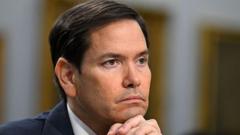As U.S. labs grapple with visa denials and severe funding cuts under the Trump administration, the nation's scientific leadership is threatened, driving international talent to consider alternative countries for their careers.
U.S. Science Under Siege: The Impact of Political Turmoil on Global Research

U.S. Science Under Siege: The Impact of Political Turmoil on Global Research
Amidst the Trump administration's policy changes, American laboratories face unprecedented challenges, forcing promising researchers to seek opportunities abroad.
For decades, the city of Bangalore, India has been a hub for nurturing scientific expertise, with many fresh Ph.D. graduates eager to join research endeavors in the United States. In typical conditions, the aspirations of these budding scientists would direct them to prestigious American laboratories—widely regarded as the best in the world.
Dr. Raj Ladher, an esteemed professor at the National Center for Biological Sciences, emphasizes the pride each graduate brings to their homeland, hoping to make significant contributions to global knowledge. However, this year presents an ominous shift. After surveying about 30 of his top students, only one secured a job in America.
The ongoing political unrest and shifting immigration policies in Washington have significantly diminished job prospects, compelling many aspiring scientists to seek positions in countries like Austria, Japan, and Australia, while some choose to remain in India.
The actions taken by the Trump administration—such as stringent visa regulations, the expulsion of foreign students, and cuts to research funding—have raised alarms among American scientists. Noted physics and data science professor David W. Hogg warns that if the trend persists, the U.S. could lose its preeminent status in scientific fields. The implications of hardening borders against non-U.S. researchers could see collaborative research endeavors crumble.
As the pace of research cuts hastens and foreign talents reconsider their futures, the scientific community in the United States grapples with an unsettling reality: the survival of its cutting-edge research ecosystem is in jeopardy, potentially ending the nation's historical dominance in global science.






















